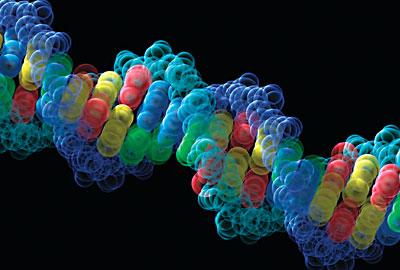Global Initiative Aims to Uncover Genetics of Eating Disorders
Abstract
Researchers hope to learn more about metabolic and other risk factors that contribute to anorexia, bulimia, and binge eating.

In the past, societal—and even some scientific—perceptions of eating disorders were beset by myths and exaggerations; for instance, it was once a popular belief that if patients were not experiencing severe weight loss, their eating disorder was not serious.
“Fortunately, our collective knowledge about eating disorders has expanded greatly, and facts are replacing fiction,” said Cynthia Bulik, Ph.D., the Distinguished Professor of Psychiatry at the University of North Carolina (UNC) School of Medicine and the founding director of the UNC Center of Excellence for Eating Disorders. For Bulik, one of the remaining frontiers in the study of eating disorders is how genes influence the risk of developing these disorders.
“Eating disorders have historically been conceptualized as psychosocial illnesses, influenced by factors like parenting style and unrealistic societal depictions of beauty,” said Bulik, who is also the associate director of the UNC Center for Psychiatric Genomics. “Social pressures toward thinness surely play a role [in these disorders], but we are starting to appreciate that genetic risk factors strongly contribute to whether these environmental factors precipitate an eating disorder.”
Though researchers have known for some time that there is a hereditary component to eating disorders, the first insight into which genes might be involved did not come until 2017. At that time, a genomic analysis of nearly 3,500 people with anorexia nervosa uncovered the first area on the genome (known as a locus) that was associated with the eating disorder. That locus was known to be associated with diabetes risk, suggesting a possible link between the two disorders. A follow-up study published in 2019—with nearly 17,000 DNA samples from people with anorexia—uncovered eight additional anorexia risk loci, implicating genes associated with body mass index and autoimmune diseases.
“The increasing number of genetic samples now available has … enabled us to examine the extent to which genes that influence anorexia also influence other traits, which has produced some remarkable associations,” Bulik noted. For example, genes associated with anorexia nervosa have not only been implicated in other psychiatric disorders, particularly obsessive-compulsive disorder, but also with body shape and weight, metabolism, and physical activity.
This suggests that anorexia nervosa may be a “metabo-psychiatric disorder” that requires clinicians to consider both metabolic and psychological risk factors when exploring prevention and treatment measures, Bulik said.
While researchers have begun to chip away at the mysteries surrounding the genetics of anorexia nervosa, they are limited to the few loci that have been identified to date. (For comparison, researchers have identified more than 200 risk loci for schizophrenia, another multi-component disorder that affects not just the brain but also metabolic and cardiac systems.)
Additionally, the field has yet to identify any specific loci linked with other major eating disorders such as bulimia nervosa or binge-eating disorder—the latter of which was not even recognized officially until DSM-5.
“We know these two disorders are also heritable, and they share some symptom profiles; but how genetically similar are they to each other, or to anorexia nervosa?” Bulik asked. Some preliminary analyses published in 2020 suggest that binge-eating disorder and bulimia also have metabo-psychiatric properties; however, people with either of these disorders are more likely to have genetic profiles associated with obesity rather than physical fitness.
Researchers around the world are hoping that the launch of the Eating Disorders Genetics Initiative (EDGI) will lead to new understandings of the role genetics plays in eating disorders. EDGI is a global initiative funded by the National Institute of Mental Health (NIMH) that ultimately aims to collect DNA samples from over 100,000 people with anorexia, bulimia, or binge-eating disorder, along with DNA from people without these disorders. NIMH-supported researchers in Australia, Denmark, New Zealand, and the United States have joined with researchers and clinicians from other countries to collect these samples, despite the restrictions that the COVID-19 pandemic has placed on clinical research.
That a genetic study of this size could be attempted in people with an eating disorder underscores the recognition of how increasingly common these disorders have become. One recent analysis suggested that the prevalence of any eating disorder more than doubled since 2000, from 3.5% in 2000 to 7.8% in 2018. Though women still make up most cases, new incidences are rising faster in men than women, dispelling another historical myth that eating disorders are limited to teen girls, Bulik said. “Eating disorders do not discriminate and can affect people of any age, ancestry, gender, or socioeconomic status.”
Eating disorders, particularly anorexia and bulimia nervosa, also carry high mortality risk due to malnutrition or suicide. The potential for the onset or recurrence of an eating disorder has only increased since the COVID-19 pandemic began. A survey conducted by Bulik and colleagues early in the pandemic found that about 80% of people in the United States with an eating disorder history were concerned that their symptoms might worsen due to complications such as social isolation and reports of COVID-related weight gain. Subsequent studies using hospital admissions data have confirmed this pandemic-fueled rise in disordered eating.
“As we are seeing with other psychiatric illnesses, genetic discoveries will not be a panacea for eating disorders,” Bulik cautioned. But researchers hope the identification of additional variants will help to unravel the complexity of these illnesses and offer insight into how genes and environment increase risk. “This ongoing global research offers hope not only for understanding but also for developing new treatments that are based on the underlying biology of the illnesses,” she added. ■
More information about the Eating Disorders Genetics Initiative is posted here.
“Significant Locus and Metabolic Genetic Correlations Revealed in Genome-Wide Association Study of Anorexia Nervosa” is posted here.
“Genome-wide Association Study Identifies Eight Risk Loci and Implicates Metabo-Psychiatric Origins for Anorexia Nervosa” is posted here.



